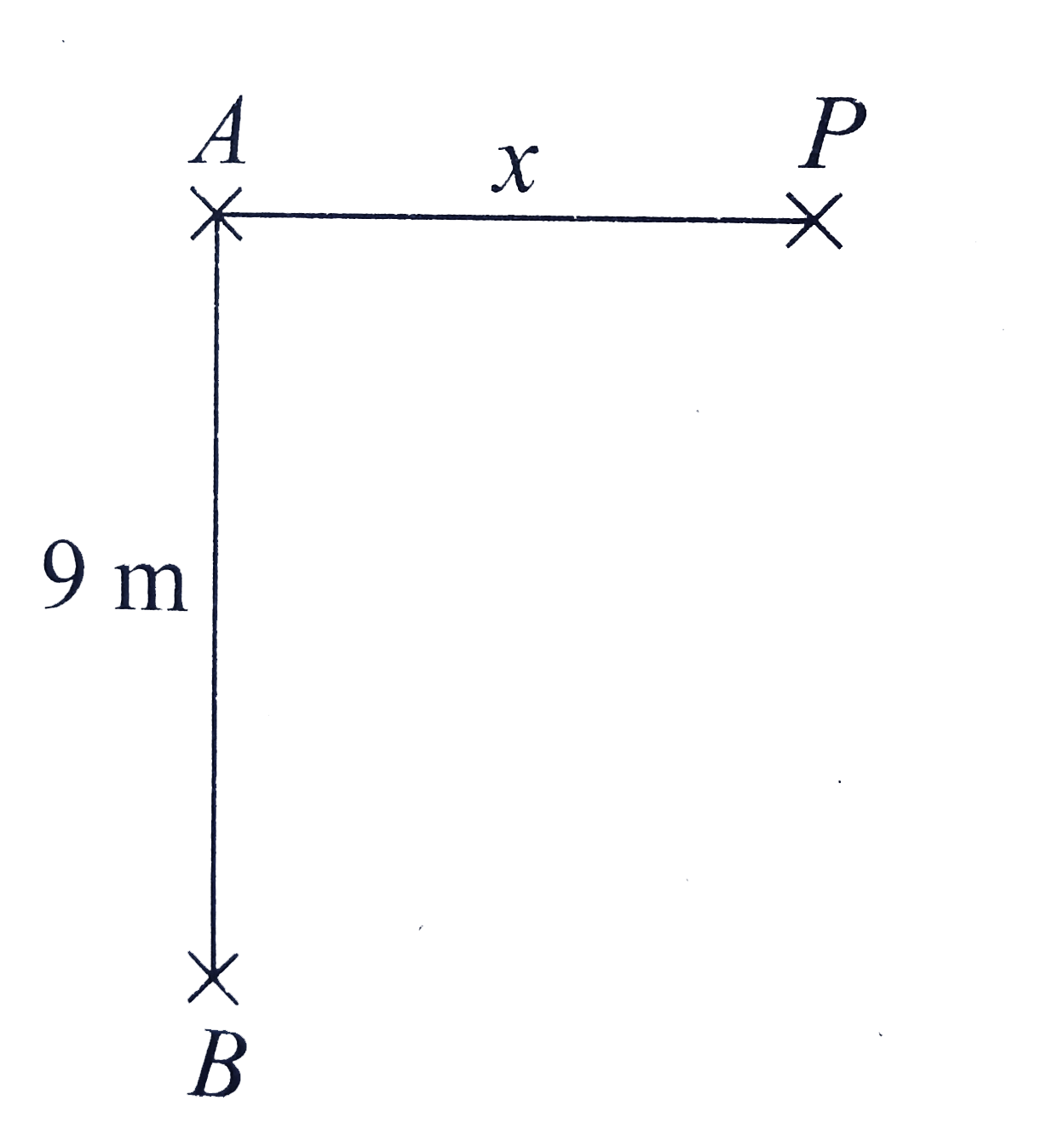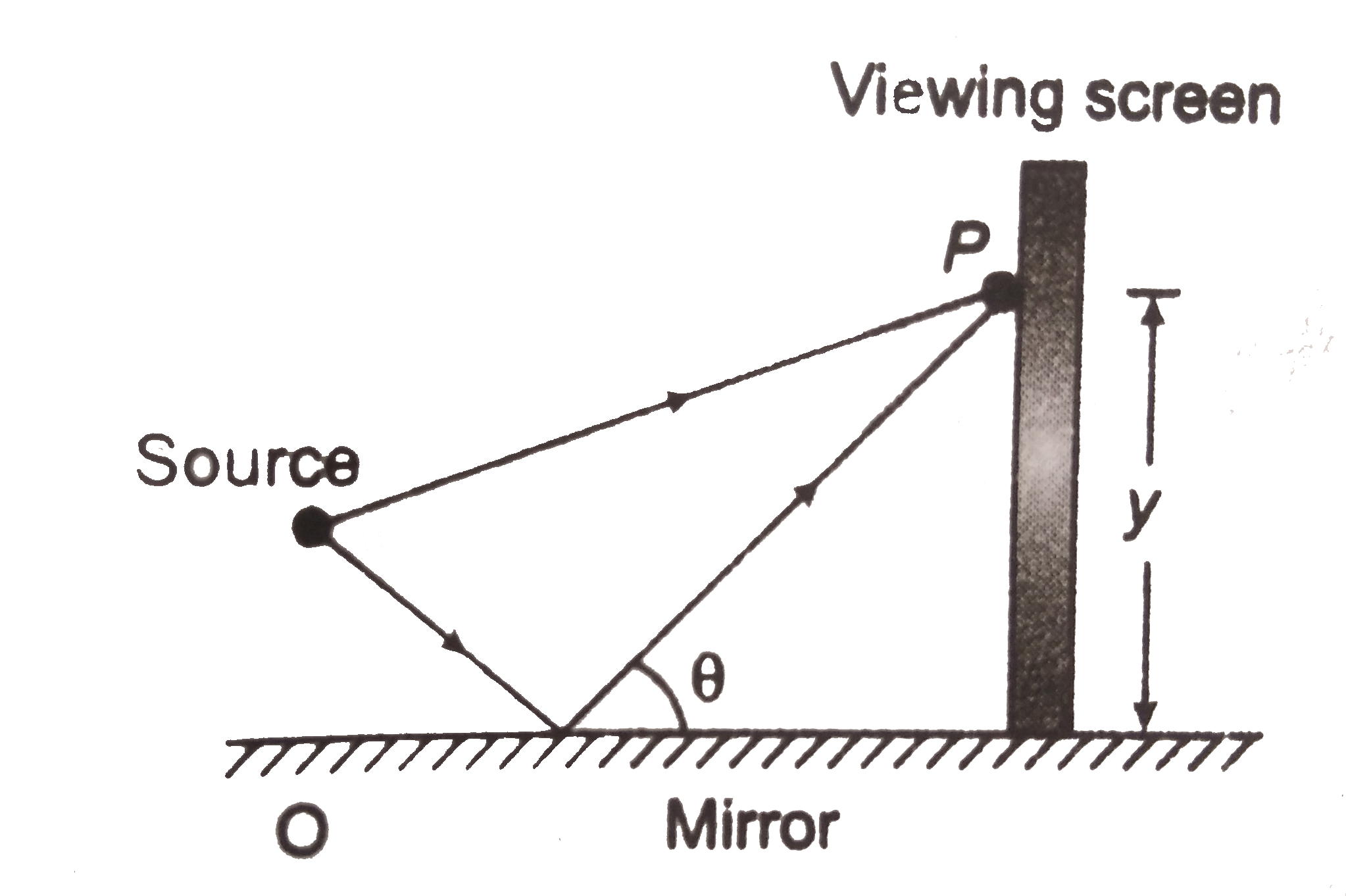Complete Solutions to Level 1Subjective of chapter INTERFERENCE AND DIFFRACTION OF LIGHT of Class 12 book with complete answers and questions
| Class 12 | PHYSICS |
| Chapter | INTERFERENCE AND DIFFRACTION OF LIGHT |
| DC PANDEY | Level 1Subjective |
| Number Of Questions | 22 |
| Academic Year | 2023-24 |
Two waves of equal frequencies have their amplitude in the ratio of 5:3. They are superimposed on each other. Calculate the ratio of the maximum to minimum intensities of the resultant wave.
View SolutionA radio transmitting station operating at a frequency of 120 MHz has two identical antennas that radiate in phase. Antenna B is 9 m to the right of antenna A. consider point P at a horizontal distance x to the right of antenna A as shown in figure. The value of x and order for which the constructive interference will occur at point P are

View SolutionCoherent light from a sodium-vapour lamp is passed through a filter that blocks everything except for light of a single wavelength. It then falls on two slits separated by 0.460 mm. In the resulting interference pattern on a screen 2.20m away, adjacent bright fringes are separated by 2.82 mm. What is the wavelength ?
View SolutionFind the angular separation between the consecutive bright fringes in a Young's double slit experiment with blue-green light of wavelength 500 nm. The separation between the slits is `2.0 xx 10^ -3` m.
View SolutionA Young's double slit apparatus has slits separated by 0.25mm and a screen 48cm away from the slits. The whole apparatus is immersed in water and the slits are illuminated by the red light (`lambda=700nm` in vacuum.) Find the fringe width of the pattern formed on the screen. `(mu_w = 4//3)`
View SolutionIn a double slit experiment, the distance between the slits is 5.0 mm and the slits are 1.0m from the screen. Two interference patterns can be seen on the screen one due to light with wavelength 480nm, and the other due to light with wavelength 600nm. What is the separation on the screen between the third order bright fringes of the two intergerence patterns?
View SolutionTwo slits spaced 0.450nm apart are placed 75.0 cm from a screen. What is the distance between the second and third dark lines of the interference pattern on the screen when the slits are illuminated with coherent light with a wavelength of 500nm?
View SolutionCoherent light with wavelength 600nm passes through two very narrow slits and the interference pattern is observed on a screen 3.00 m from the slits. The first order bright fringe is at 4.94 mm from the centre of the central bright fringe. For what wavelength of light will the first order dark fringe be observed at this same point on the screen?
View SolutionTwo very narrow slits are spaced `1.80 mu`m apart and are placed 35.0 cm from a screen. What is the distance between the first and second dark lines of the interference pattern when the slits are illuminated with coherent light of `lambda = 550nm ?` (Hint : The angle `theta` is not small).
View SolutionA narrow beam of 100eV electrons is fired at two parallel slits very close to each other. The distance between the slits is 10Å. The electrons waves after passing through the slits interfere on a screen 3m away from slits and form interference fringes. Find the width of the fringe.
View SolutionIn a Young's double slits set up, the wavelength of light used is 546nm. The distance of screen from slits is 1m. The slits separation is 0.3 mm.
(a) Compare the intensity at a point P distant 10mm from the central fringe where the intensity is `I_0`.
(b) Find the number of bright fringes between P and the central fringe.
View SolutionInterference pattern with Young's double slits 1.5mm apart are formed on a screen at a distance 1.5m from the plane of slits. In the path of the beam of one of the slits, a transparent film of 10 micron thickness and of refractive index 1.6 is interposed while in the path of the beam from the older slit a transparent film of 15 micron thickness and of refractive index 1.2 is interposed. Find the displacement of the fringe patten.
View SolutionIn a Young's double slit experiment using monochromatic light, the fringe pattern shifts by a certain distance on the screen when a mica sheet of refractive index 1.6 and thickness 1.964 microns is introduced in the path of one of the interfering waves. The mica sheet is then removed and the distance between the slits and screen is doubled. It is found that the distance between successive maxima now is the same as observed fringe shift upon the introduced of the mica sheet . Calculate the wavelength of the monochromatic light used in the experiment .
View SolutionInterference effects are produced at point P on a screen as a result of direct rays from a 500 nm source and reflected rays from a mirror, as shown in figure. If the sources is 100m to the left of the screen and 1.00 cm above the mirror, find the distance y (in milimeters) to the first dark band above the mirror.

View SolutionWhat is the thinnest film of coating with n= 1.42 on glass (n=1.52) for which destructive interference of the red component (650 nm) of an incident white light beam in air can take place by reflection ?
View SolutionA glass plate (n=1.53) that is 0.485 ` mu` m thick and surrounded by air is illuminated by a beam of white light normal to the plate.
(a) What wavelengths (in air) within the limits of the visible spectrum `(lambda = 400 "to" 700 nm)` are intensified in the reflected beam ?
(b) What wavelengths within the visible spectrum are intensified in the transmitted light?
View SolutionA thick glass slab `(mu= 1.5)` is to be viewed in reflected white light. It is proposed to coat the slab with a thin layer of a material having refractive index 1.3 so that the wavelength 6000 Å os suppressed. Find the minimum thickness of the coating required.
View SolutionAn oil film covers the surface of a small pond. The refractive index of the oil is greater than that of water. At one point on the film, the film has the smallest non-zero thickness for which there will be destructive interference in the reflected light when infrared radiation with wavelength 800 nm is incident normal to the film. When this film is viewed at normal incidence at this same point, for what visible wavelengths, if any, will there be constructive interference? (Visible light has wavelengths between 400nm and 700 nm )
View SolutionA possible means for making an airplane invisible to radar is to coat the plane with an anti reflective polymer. If radar waves have a wavelength of 3.00 cm and the index of refraction of the polymer is `mu=1.5`. How thick is the oil film? Refractive index of the material of airplane wings is greater than the refractive index of polymer.
View SolutionDetermine what happens to the double slits interference pattern if one of the slits is covered with a thin, transparent film whose thickness is `lambda/(2(mu-1))`, where `lambda` is the wavelength of the incident light and mu is the index of refraction of the film.
View SolutionTwo slits `4.0 xx 10^(-6)` m apart are illuminated by light of wavelength 600nm . What is the highest order fringe in the interference pattern?
View SolutionConsider an interference experiment using eight equally spaced slits. Determine the smallest phase different in the waves from adjacent slits such that the resultant wave has zero amplitude.
View Solution
Level 1Subjective questions and complete solutions for chapter INTERFERENCE AND DIFFRACTION OF LIGHT of DC PANDEY ENGLISH of Class 12
All Exercises from DC PANDEY Class 12 PHYSICS INTERFERENCE AND DIFFRACTION OF LIGHT
- Example
- Example Type 1
- Example Type 2
- Example Type 3
- Example Type 4
- Example Type 5
- Example Type 6
- Exercise 32.1
- Exercise 32.2
- Level 1 Assertion And Reason
- Level 1 Objective
- Level 1Subjective
- LEVEL 2 (single correct option)
- Level 2 Comprehensionn Based
- Level 2 More Than One Correct
- Level 2 Single Correct
- Level 2 Subjective
- Miscellaneous Examples
- Objective question
- Subjective Questions
- type-3
- type-5